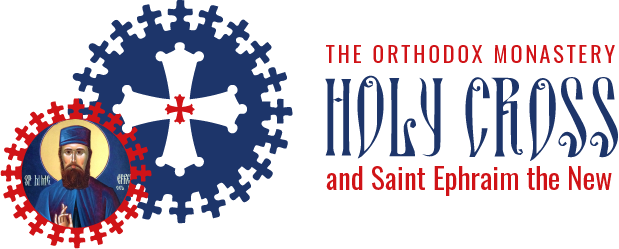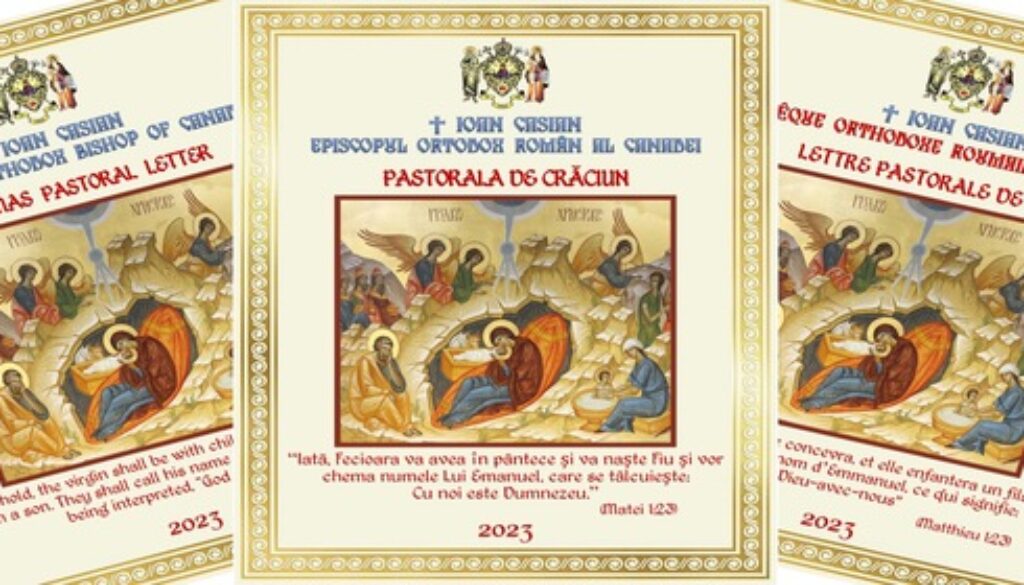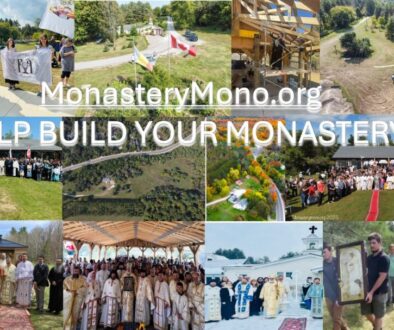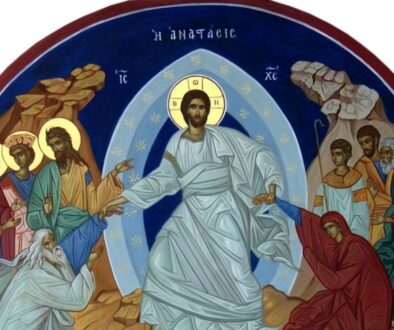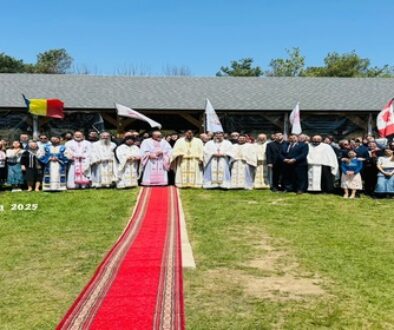† IOAN CASIAN: PASTORAL LETTER AT THE FEAST OF THE LORD’S NATIVITY, 2023
PASTORAL LETTER
AT THE FEAST OF THE LORD’S NATIVITY, 2023
† IOAN CASIAN
by the mercies of God,
Bishop of the Romanian Orthodox Diocese of Canada
To our beloved Clergy and Orthodox Christians,
peace and joy from Christ the Lord,
and from us, hierarchical blessings.
“Behold, the virgin shall conceive and bear a Son,
and they shall name Him Emmanuel,
which means ‘God is with us.’”
(Matthew 1, 23)
Most Reverend Fathers,
Beloved Faithful,
The birth of our Lord Jesus Christ comes to consecrate an expectation and a hope that God encouraged and nourished through inspired words and through the miracles performed over time in the Old Testament. Holy Scripture in its entirety represents the footsteps of God in our human history.
Let’s remember that in the Book of Genesis it is written: “And the Spirit of God was hovering over the face of the waters”[1]and after Adam and Eve sinned, we read again that “they heard the sound of the Lord God walking in the garden in the cool of the day.”[2] From the two remarks we understand that from the beginning of human history, from the first pages of the Holy Scriptures, the connection between man and God appears as one naturally present. It appears like a connection that involves proximity, a concrete presence with beneficial effects, dialogue and synergistic intercommunication between the word and divine grace in the sense of healthy growth towards a pure life, towards a life of holiness and towards eternity.
The conditions preestablished by God in His gesture of revealing His endless love and generosity towards man are His presence and proximity to him and the dialogue with him to make him fulfill his vocation as the crown of all creation.
Following man’s fall into sin, God prepares his restoration, redemption, and salvation in view of eternal life. God prepares man through words and deeds to receive His Son Jesus Christ through the incarnation from the Virgin Mary. This is how St. Ephrem the Syrian describes this state of preparation to which man is called to adhere: “Serene is the night in which the Pure One arose, Who came to lighten us up; let us not mix in our vigil anything that might disturb it. Let the path of the ear be smoothed, the sight of the eye be clarified, the thinking of the heart be sanctified, the utterance of the mouth be purified!”[3] St. Ephrem the Syrian prepares us for the moment of welcoming the nativity of Christ, the moment when the Church experiences the event of His coming and His incarnation for us and for our salvation. The firmament of man’s thinking and life on the night of Christ’s birth must be serene and clear because only in this way humanity can receive the Pure and Holy One. We humans must return to the moment of serenity, simplicity, and holiness of the paradisiacal state in which man contemplates God naturally. What we understand from St. Ephrem’s words is that man’s state is not necessarily an external, material one, but an internal one because the fall was first internal and then the external consequences followed. The hearing, the sight, the thinking, and the speaking are those human instruments that make us understand that our most important human reality is an inner one, with which we can make the firmament of the night in which the Infinite One is born to us, be clouded or not. That is why St. Ephrem exhorts us to smooth the hearing, to clear the eye, to sanctify the conscience of the heart and to purify the language. This effort prepares us to welcome the Lord on the night of His birth in a proper way. We are preparing ourselves like the Virgin Mary to hear the good news of the archangel Gabriel at the Annunciation and the singing of the angels from the fields of Bethlehem on the night of Christ’s birth. We ourselves, the Church as a whole, will have to resemble the Virgin, that is, prepare for the birth of the Lord into the world.
What does this night of the Nativity mean? What gifts do we receive from God through the birth of His Son Jesus Christ according to the flesh from the Virgin Mary?
“This is the night of reconciliation – says St. Ephrem the Syrian; – no one frowning and shadowy should be in it; in this night that gives peace to all, let no one threaten and make trouble! … On this day of forgiveness, let’s no one avenge a mistake! On this day of joy let’s not share sorrows! … On this day when God came to sinners, let the righteous not rise in his conscience above the sinner!”[4] There are several exhortations addressed to us by St. Ephrem that represent so many gifts of God to us. What Christ gives us on the night of His birth is our reconciliation with God and the peace that the first people had lost because of sin. This condition has been passed on to the generations that have followed until today. Christ also brings us on the night of His birth the forgiveness of sins and the joy that springs from it. By forgiving sins, Christ restores the serenity of our original state of sinlessness and purity. We receive on the night of Christ’s birth the virtue of humility because the righteous are called to learn not to exalt themselves and consider superior on sinners for Christ came for us all.
But one may ask why we should follow these exhortations? St. Ephrem the Syrian gives us the reason for this – we are the image and likeness of God and His heirs, and we must follow His example: “(…) Let us give thanks to Him who placed His Fruit in our tree, thanks be given to the One Who sent His Heir, that through Him He might draw us to Himself and make us heirs with Him!”[5] “On this day when the Lord of all came to His servants, let the masters also bow down in love to their servants! On this day in which the Rich One became poor for us, let the rich man also let the poor partake of his table! In this we were shown a gift that we did not ask for. Let us, therefore, give alms to those who ask us loudly!”[6] The coming of the Lord Jesus Christ through incarnation to us is a gift that cannot be measured. Receiving the Son of God in the incarnation is not a merited gift. The example of God’s love and dedication must only be followed. Just as the boundlessness of Christ’s love and dedication to us is infinite, so must we be towards our neighbor, whether this one is great or small, young or old, slave or master, poor or rich; and this because we are called as persons who have been created in the image of God to reach His likeness, and this cannot be done otherwise than by following His way and imitating His example and life. Let the immeasurable gift of our restauration, redemption and salvation given by Christ shine and take form in our human relationships. Let us imitate the example of God’s love and generosity in Christ and let us manifest it to those around us. Only in this way will we be able to build human relationships and a society that reflects the spirit of God and the atmosphere of Heaven.
What changed on the night of the Nativity compared to the time before this event? What did the night of the Nativity bring us?
St. Ephrem the Syrian gives us the answer: “This is the day that opened the door of heaven to our prayers. And let us open our doors to those who have wronged us and ask us for forgiveness. The Lord of natures has changed today against His nature. Let it not be too difficult for us to change our bad will! The body is bound to its nature, for it is not able to change its size. However, the will is free to grow to any extent. Today the Godhead imprinted Himself in humanity, so that humanity may also be imprinted and beautified in the seal of the Godhead!”[7] The incarnation of our Lord Jesus Christ brings a fundamental change. If our prayers until then were powerless because the firmament of our mind and thinking was clouded due to sin and the weakness of the word, with the birth of Christ, the paradise and the gates of the eternal life are opened to us because we are visited by the Son of God who came from above. Just as the Son of God wanted to take on human nature in His hypostasis to be able to give us the grace of healing and salvation, so let us strive to change our will internally to receive the benefits of the work of Christ God. This is why we must do these things – because our model is Jesus Christ. He is the One who precedes us and opens the way for us to fulfill our divine vocation.
This is possible because of the union of the divine and human natures in Christ. This union restores the fundamental synergistic connection between the divine and the human nature. The divine marks the human and the human become a deified ornament.
The day of the Lord’s nativity brings healing and eternal blessing: “Great is the wealth of the day of Your birth! It pays the debt for us debtors! … Treasure of remedies is Your great day; for in it has sprung up life-giving medicine for those wounded by death.”[8] The incarnation and birth of Christ lay the foundations for the healing of man from his disease resulting from sin – the death. The incarnation and the coming among us of the Son of the Eternal God opens us the way to the eternal life for which we were created.
What was the purpose of the incarnation?
“Praised be the Wise God, Who tied and joined the Godhead and humanity, One from above, the other from below! – says St. Ephrem. He mixed the two natures like colors and an icon appeared: the God-man.”[9] God’s purpose, through the incarnation and birth of His Son and the union of human and divine nature in His person, was to restore to man the stature and dignity which He had established for him at the beginning of creation and which man had lost because of sin. The separation of heaven and earth is abolished by the incarnation for the two worlds are reunited. But even more, man becomes a new reality as soon as the divine-humanity becomes his foundation. The person of the incarnate Son of God, Christ the Lord, becomes the cause, the model and the paradigm of our renewal in God.
What did the birth of Christ the Savior mean for us?
“Your birth, Lord, became the mother of all creatures, because it conceived and gave birth again to the humanity that gave birth to You. She gave birth to You physically, and You gave birth to her spiritually. That is why You were born, to give birth to people in Your likeness. Behold, Your birth begets all. Blessed be He who made Himself young and made all things young!”[10] The incarnation and birth of the Lord was done for the renewal of the entire creation, of the entire being. If humanity gives human nature to the Son of God, God gives it spirituality and transfiguring grace. Through birth Christ renews the entire humanity. Through incarnation and birth into our humanity He restores our likeness to God. The effects of His nativity on human nature are beyond our ability to comprehend and understand.
Through incarnation and birth God dwells amongst us according to the body and to the spirit. Man relearns to live the natural state of the presence and the companionship with God in Paradise. He confidently understands that God is always with us.
Dear Christians,
The year 2023 was dedicated to the pastoral care of the elderly and to hymnographers and Church chanters. These two themes invite us to become responsible in regard of our neighbor and of the Church. First, we should think to those because of whom we have the society in which we live and the Churches in which we pray. It is also because of their love and sense of responsibility that we saw by birth the light of the day and enjoy life. It is also because of them that we enjoyed the gift of being able to go to a school or university where we became what we are. They are the ones who sacrificed themselves for us to be able to fulfill our vocation. That’s why we should also be grateful by taking care of them at these moments when their forces decrease, and their energy diminishes.
Let us also be attentive to those who with care and talent endowed the Churches with their voices that helped us to pray with great sensitivity accompanied by a beautiful and harmonious music.
I would like in this festive time of our Lord Jesus Christ’s Nativity, to send the warmest blessings and greetings of gratitude to the Clergy and to those responsible at the diocesan and parish level, to the representatives of the Ladies’ Auxiliary (AROLA) and the Youth Organisation (ROYA), to the coordinators in the field of education and Sunday schools, as well as to all the faithful for dedication, diligence, spirit of responsibility and attachment to the Church and to the community!
I urge you to persevere in prayer and spiritual effort to receive help and spiritual strengthening from God to be able to continue our mission in the service of Him, the Church and our neighbor.
On the occasion of the great feast of the Nativity of our Lord, let us welcome the Divine Child Jesus Christ with the hymns chanted by the whole Church: “Christ is born; glorify Him! Christ comes from heaven; come to welcome Him! Christ is on earth; lift up your hearts! Sing to the Lord, O earth! Be exalted and sing with hearty gladness, O ye people, sing His praise for He is glorified!”[11]
On the feast of the Nativity of our Lord Jesus Christ, New Year and Epiphany, I greet you with the salutation of St. Paul the Apostle: “The grace of our Lord Jesus Christ be with your spirit. Amen” (Philemon 1, 25).
A feast of the Nativity of our Lord Jesus Christ with joy, harmony, peace, and divine grace!
A blessed New Year!
Your brother in prayer to Christ the Lord,
† IOAN CASIAN
Saint-Hubert/Montreal, 2023
________________
[1] Genesis 1, 2
[2] Genesis 3, 8
[3] Hymns of the Nativity in St. Ephrem the Syrian. Hymns of the Nativity and Theophany of the Lord. (2nd ed. / presentation and translation by Ioan I. Ică jr.) Deisis Publishing House: Sibiu 2010, 1.82-83, p. 23
[4] Idem 1.88, 90, 92, p. 24
[5] Idem 3.12, p. 33-34
[6] Idem 1.88, 93-95, p. 24
[7] Idem 1.96-99, p. 24-25
[8] Idem 4.22, 24, p. 38
[9] Idem 8.2, p. 63
[10] Idem 23.5, p. 115
[11] Katavasia 1, Mattins of the Nativity of the Lord
